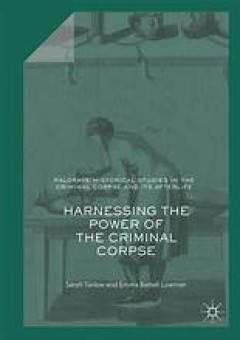Filter by

Resilient Urban Futures
This open access book addresses the way in which urban and urbanizing regions profoundly impact and are impacted by climate change. The editors and authors show why cities must wage simultaneous battles to curb global climate change trends while adapting and transforming to address local climate impacts. This book addresses how cities develop anticipatory and long-range planning capacities for …
- Edition
- 1
- ISBN/ISSN
- 978-3-030-63131-4
- Collation
- oer.unej.ac.id
- Series Title
- The Urban Book Series
- Call Number
- 307

Harnessing the Power of the Criminal Corpse
This open access book is the culmination of many years of research on what happened to the bodies of executed criminals in the past. Focusing on the eighteenth and nineteenth centuries, it looks at the consequences of the 1752 Murder Act. These criminal bodies had a crucial role in the history of medicine, and the history of crime, and great symbolic resonance in literature and popular culture.…
- Edition
- 1
- ISBN/ISSN
- 978-3-319-77908-9
- Collation
- -
- Series Title
- Palgrave Historical Studies in the Criminal Corpse and its Afterlife
- Call Number
- -

The Golden and Ghoulish Age of the Gibbet in Britain
This book is open access under a CC BY 4.0 licence. This book is the first academic study of the post-mortem practice of gibbeting (‘hanging in chains’), since the nineteenth century. Gibbeting involved placing the executed body of a malefactor in an iron cage and suspending it from a tall post. A body might remain in the gibbet for many decades, while it gradually fell to pieces. H…
- Edition
- 1
- ISBN/ISSN
- 978-1-137-60089-9
- Collation
- -
- Series Title
- Palgrave Historical Studies in the Criminal Corpse and its Afterlife
- Call Number
- -

Capital Punishment and the Criminal Corpse in Scotland, 1740–1834
This book is open access under a CC BY 4.0 license. This book provides the most in-depth study of capital punishment in Scotland between the mid-eighteenth and early nineteenth century to date. Based upon an extensive gathering and analysis of previously untapped resources, it takes the reader on a journey from the courtrooms of Scotland to the theatre of the gallows. It introduces them …
- Edition
- 1
- ISBN/ISSN
- 978-3-319-62018-3
- Collation
- -
- Series Title
- Palgrave Historical Studies in the Criminal Corpse and its Afterlife
- Call Number
- -

Dissecting the Criminal Corpse
Those convicted of homicide were hanged on the public gallows before being dissected under the Murder Act in Georgian England. Yet, from 1752, whether criminals actually died on the hanging tree or in the dissection room remained a medical mystery in early modern society. Dissecting the Criminal Corpse takes issue with the historical cliché of corpses dangling from the hangman’s rope in crim…
- Edition
- 1
- ISBN/ISSN
- 978-1-137-58249-2
- Collation
- -
- Series Title
- Palgrave Historical Studies in the Criminal Corpse and its Afterlife
- Call Number
- XXX, 326

Narratives of the Unspoken in Contemporary Irish Fiction
This Open access book is a collection of essays and offers an in-depth analysis of silence as an aesthetic practice and a textual strategy which paradoxically speaks of the unspoken nature of many inconvenient hidden truths of Irish society in the work of contemporary fiction writers. The study acknowledges Ireland’s history of damaging silences and considers its legacies, but it also undersc…
- Edition
- 1
- ISBN/ISSN
- 978-3-031-30455-2
- Collation
- -
- Series Title
- New Directions in Irish and Irish American Literature
- Call Number
- XIX, 246

UK Child Migration to Australia, 1945-1970
This open access book offers an unprecedented analysis of child welfare schemes, situating them in the wider context of post-war policy debates about the care of children. Between 1945 and 1970, an estimated 3,500 children were sent from Britain to Australia, unaccompanied by their parents, through child migration schemes funded by the Australian and British Governments and delivered by churche…
- Edition
- 1
- ISBN/ISSN
- 978-3-030-69728-0
- Collation
- -
- Series Title
- Palgrave Studies in the History of Childhood
- Call Number
- XIII, 338

Disrupted Development and the Future of Inequality in the Age of Automation
This open access book examines the future of inequality, work and wages in the age of automation with a focus on developing countries. The authors argue that the rise of a global ‘robot reserve army’ has profound effects on labor markets and economic development, but, rather than causing mass unemployment, new technologies are more likely to lead to stagnant wages and premature deindustrial…
- Edition
- 1
- ISBN/ISSN
- 978-3-030-30131-6
- Collation
- -
- Series Title
- -
- Call Number
- XIII, 102

How AI Impacts Urban Living and Public Health; 17th International Conference,…
Buku akses terbuka ini merupakan prosiding wasit dari Konferensi Internasional ke-17 tentang Pemrosesan String dan Pengambilan Informasi, ICOST 2019, yang diadakan di New York City, NY, AS, pada Oktober 2019. 15 makalah lengkap dan 5 makalah pendek yang disajikan dalam volume ini ditinjau dan dipilih dengan cermat dari 24 pengajuan. Mereka membahas topik-topik seperti: desain teknologi e-health…
- Edition
- -
- ISBN/ISSN
- 978-3-030-32785-9
- Collation
- 1 online resource (XIV, 214 Pages)
- Series Title
- -
- Call Number
- 006.3 PAG h

Tools and Algorithms for the Construction and Analysis of Systems; 25th Inter…
Kumpulan prosiding LNC 11427 dan 11428 merupakan prosiding Konferensi Internasional ke-25 tentang Alat dan Algoritma untuk Konstruksi dan Analisis Sistem, TACAS 2019, yang berlangsung di Praha, Republik Ceko, pada bulan April 2019, yang diadakan sebagai bagian dari Konferensi Bersama Eropa tentang Teori dan Praktik Perangkat Lunak, ETAPS 2019. Total 42 makalah demo alat lengkap dan 8 pendek yan…
- Edition
- 1
- ISBN/ISSN
- 978-3-030-17465-1
- Collation
- 1 online resource (426 Pages)
- Series Title
- -
- Call Number
- 004.21 VOJ t
 Computer Science, Information & General Works
Computer Science, Information & General Works  Philosophy & Psychology
Philosophy & Psychology  Religion
Religion  Social Sciences
Social Sciences  Language
Language  Pure Science
Pure Science  Applied Sciences
Applied Sciences  Art & Recreation
Art & Recreation  Literature
Literature  History & Geography
History & Geography